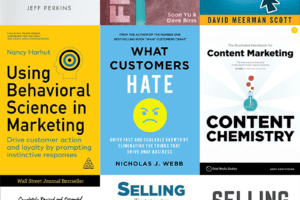Episode 71 of Yes, and Marketing
Guest-at-a-Glance
???? Name: Steve Pockross
???? What he does: CEO of Verblio and host of the Yes, and Marketing podcast.
????️ Find Steve on the web: Verblio | LinkedIn
???? Get smart: “The people are much more important than the processes.”
Top Takeaway
What it *really* means to put people first ????
Plenty of companies talk about having a people-first strategy, but few are committed to living it every day. “A people-first strategy means focusing on your team as the biggest priority that you have as a leader,” Steve says. “More than sales, more than product, more than your clients.”
What does this look like in practice? At Verblio, it has meant prioritizing professional development and executive coaching for the existing team over making new hires. It means Steve commits a significant amount of time to one-on-one meetings with everyone in the company to stay in sync with how they’re doing. It also means that Last Fridays Off—a practice the company started for mental health during the pandemic—have become permanent.
Most importantly, it’s staying committed to your people through both the good and bad. “It’s easy to make a speech on stage and say, ‘We just grew a hundred percent last month. We’re amazing. Everybody gets free pizza.’ But what are you going to say when it doesn’t happen that way?” Steve adds.
Episode Highlights
It’s not just about the mission
“A lot of the nonprofits that I’ve seen actually miss this—they focus so much on their mission but they don’t focus enough on their own people in order to make sure that they’re having a great experience. And I think it actually lessens the impact that they can have.”
When ‘people-first’ matters the most
“I went to a lot of companies that really thought they were doing people-first strategies, and then when anything hit the fan, they basically pulled out and then let people go in very abrupt ways. …You really see people’s character when things get hard. When things are easy, it’s easy to make a speech on stage and say, ‘Look, we just grew a hundred percent last month. We’re amazing. Everybody gets free pizza.’ But what are you going to say when it doesn’t happen that way?”
Why Verblio instituted Last Fridays Off ????
“Having time off when everyone in the company has time off at the same time is so different than having time off whenever you want it, but you come back to a full inbox.”
One bottom line benefit of a people-first strategy
“We have very few people turnover at the company. And then what that means is productivity-wise, when somebody leaves, you lose what, like six months of productivity for that person? It’s a giant loss. You’ve got three months of finding them, six months of bringing them on… It’s such a hidden cost. The finance person never looks at that, but you just feel it throughout the organization.
We have such a low churn of like, a couple people a year at most. We’ve had multiple years where we didn’t lose anybody. And it keeps our productivity high and able to compete in a way that we can have a competitive advantage against people with a lot more funding.”
Inbound marketing as a hiring strategy
“Our strategy was, we are going to find the best talent we can as a bootstrapped company. And how are we going to attract them and bring them on? First, we have to build a magnet that they want to come to. We have to build a culture they’re excited about. They show up on our page. Our job postings are basically like giant marketing advertisements by the time you read it, you should have laughed four times and been like, ‘This is where I want to be.’
And then we have to target totally different people. If you’re going to target based on experience, we’re going to target based on traits. We want curiosity and scrappiness and energy. And if you have the experience, we probably can’t afford you and you might need to just go to that giant VC backed corporation anyway.”
Where brand meets people-first
“Brand is a people-first strategy focused on the outside world. A people-first strategy internally is, ‘What type of company would I want to be at? How would I want to be treated? How would I want to know my roles and responsibility and strategy?’ And externally for brand it’s, ‘What do I find engaging? What would I want to know about this company? What would make me want to work with them?’”
Lessons from Ultimate Frisbee ????
“I learned all of my major lessons about being a CEO from an Ultimate Frisbee team, which is, everybody knows the same strategy, everyone can recruit players, but if you have a more fun team, your team is going to be more successful.
I have this theory—there’s no proof behind this whatsoever, it’s just lots of observation—which is that if you look across the world of sports and you look at every coach or captain, the ones that smile the most will have the best teams.”
Lessons from joining a band ????
“The hardest parts of a song are starting it and ending it, which is very similar to product strategy—just like it’s really hard to actually get your product on the way, and it’s hard to say it’s actually done.”
Top Quotes
????️Steve:
“I thought that the mission was the most important thing, but actually engaging people and making them want to work there is just as important.”
“The people are much more important than the processes.”
“If you have a great team, then you’re going to attract other great players who are more fun and they’re going to build on each other, and then they recruit their favorite players that they want to play with.”
“A people-first strategy has to fit who you are in order for it to work, and it has to really be what you want to do. You can’t fake that.”
????️Suneet:
“I think nothing prepares you for life as a startup founder, than learning to work for free for a period of time.”
“It is about elevating team members to get the most out of them, as opposed to commanding them to squeeze the most out of them.”
Learn More
Check out The Inner Game of Tennis, a book Steve mentions on the show.
He says, “It’s about how you actually make people better: you motivate them and you hit their unconscious and make them more relaxed and more excited to be there versus memorizing five to 10 other tactics that just stress them out and actually make it harder to reach your state of flow and to really be great at what you do.”



